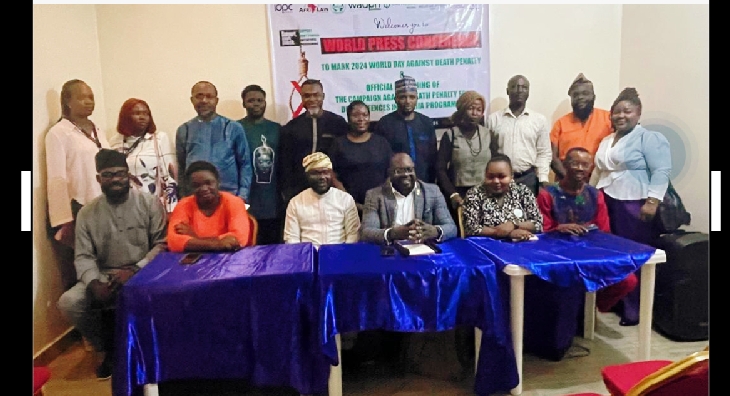Nigeria’s Death Penalty for Drug Crimes Faces Mounting Opposition”
Maryam Aminu
A new chapter in the fight against capital punishment for drug-related crimes in Nigeria has been opened with the official launch of the “Campaign Against Death Penalty for Drug Offences” during a world press conference held today at ParkView Hotel, Abuja.
The event marked the 2024 World Day Against Death Penalty and brought together key stakeholders from civil society, legal organizations, and international partners.
Leading the charge, the Coordinator of the Campaign Against Death Penalty for Drug Offences in Nigeria Programme, Barrister Okereke Chinwike, emphasized the urgency of national advocacy to remove the death penalty as a sanction for drug-related offences in the ongoing amendment of the National Drug Law Enforcement Agency (NDLEA) Act.
The programme, which will run from September 2024 to February 2025, is coordinated by the African Law Foundation (AFRILAW) in partnership with leading organizations like Avocats Sans Frontières (ASF) France, YouthRISE Nigeria,France/Lawyers Without Boarders, Drug Harm Reduction Advocacy Network and the International Drug Policy Consortium (IDPC) UK.
Barrister Chinwike highlighted the ongoing support of Nigeria’s National Drug Law Enforcement Agency (NDLEA) in tackling the country’s escalating drug problems but raised serious concerns about the controversial reintroduction of the death penalty for drug offences in a bill recently passed by the Senate.
The amendment bill proposes the death penalty for individuals involved in manufacturing, processing, and trafficking dangerous drugs.
According to Chinwike, the approval of this provision by the Senate in May 2024 is not only retrogressive but also contradicts global trends and best practices.
“The decision by the National Assembly to enact a militarized and draconian law for drug control is an unfortunate step backward. The death penalty has consistently failed to deter crime more effectively than life imprisonment or other punishments. In fact, the United Nations, as well as several international human rights bodies, have repeatedly stated that death penalty sentences for drug offences are violations of human rights,” he stated.
The African Law Foundation and its partners, including over 275 civil society organizations, have united in their demand for the removal of the death penalty from the bill.
The coalition sent an open letter to President Bola Tinubu, urging him not to assent to the bill unless the death penalty provision is struck out.
“We are not condoning drug-related crimes, but we are advocating for an approach that prioritizes human rights, health, and public safety,” Chinwike said.
Chinwike also pointed out the economic and social costs of this punitive approach, warning that it would burden Nigeria’s already overstretched criminal justice system.
“Incarcerating individuals under harsh laws without offering alternatives will only worsen prison overcrowding and raise healthcare costs, ultimately hindering progress in drug harm reduction efforts initiated by the Federal Ministry of Health,” he explained.
The coalition called for the total abolition of the death penalty in Nigeria, urging the government to replace capital punishment with life imprisonment and to impose an official moratorium on all executions.
The campaign’s activities, slated for the coming months, include advocacy visits to key policymakers, a nationwide public awareness drive, and Nigeria’s first-ever Drug Law Reform Summit.
This initiative aims to align the nation’s drug laws with a more humane, health-centered approach, ensuring justice without resorting to death sentences.
Speaking also, the Program Lead Drug Harm Reduction Advocacy Network, David Moses Olofu, condemned the use of the death penalty for drug-related offenses, stressing that every family is directly or indirectly affcected by drug issues.
“We are adopting an evidence-based approach,” he said, adding that criminalizing drug users has not curbed the death toll as intended.
He emphasized that the death penalty for drug offenders has not yielded the positive outcomes society hopes for. “Criminalizing drug users doesn’t necessarily stop them from continuing their drug use,” Olofu remarked.
He also highlighted several upcoming projects aimed at addressing these challenges, urging the public not to view drug addiction as a distant problem. “Drugs are an issue within our society,” he noted.
Olofu commended the efforts of the National Drug Law Enforcement Agency (NDLEA) but called for a shift in focus towards healthier practices that encourage drug users to seek help. “Rehabilitation and support systems are vital in helping users come forward, rather than pushing them further away,” he concluded.
As the debate around the NDLEA amendment bill intensifies, all eyes will be on Nigeria’s leadership to decide whether the country will move forward by embracing international norms or revert to punitive measures that many see as outdated and ineffective.




